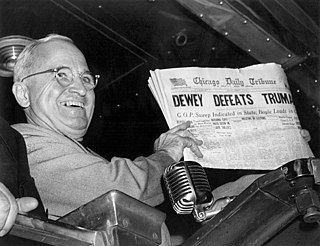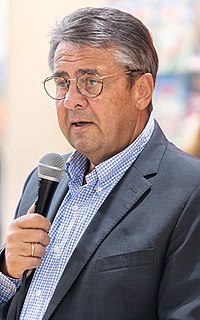The Christian Social Union in Bavaria is a Christian-democratic and conservative political party in Germany. The CSU operates only in Bavaria while its larger counterpart, the Christian Democratic Union (CDU), operates in the other fifteen states of Germany. It differs from the CDU by being somewhat more conservative in social matters. The CSU is considered an effective successor of the Weimar-era Catholic Bavarian People's Party (BVP).

The Free Democratic Party is a liberal and classical liberal political party in Germany. The FDP is led by Christian Lindner.

Germany is a democratic, federal parliamentary republic, where federal legislative power is vested in the Bundestag and the Bundesrat.

The Christian Democratic Union of Germany is a Christian-democratic, liberal-conservative political party in Germany. It is the major catch-all party of the centre-right in German politics. The CDU forms the CDU/CSU grouping, also known as the Union, in the Bundestag with its Bavarian counterpart the Christian Social Union in Bavaria (CSU). The party is widely considered an effective successor of the Centre Party, although it has a broader base.
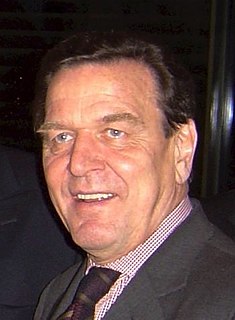
Federal elections were held in Germany on 27 September 1998 to elect the members of the 14th Bundestag. The Social Democratic Party emerged as the largest faction in parliament, with its leader Gerhard Schröder becoming Chancellor.

The North Rhine-Westphalia state election, 2005, was conducted on 22 May 2005, to elect members to the Landtag of North Rhine-Westphalia in Germany. It was a victory for the Christian Democratic Union, who received enough seats to form a coalition with their preferred partner, the FDP, and end the previous government formed by the Social Democratic Party and the Greens, who also ruled at the federal level.
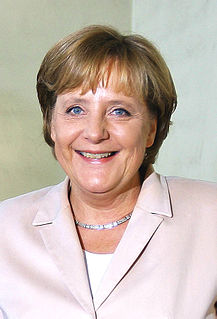
Federal elections were held in Germany on 18 September 2005 to elect the members of the 16th Bundestag. This became necessary after a motion of confidence in Chancellor Gerhard Schröder failed on 1 July. Following the defeat of Schröder's Social Democratic Party (SPD) in a state election, Schröder asked his supporters to abstain from the Bundestag motion, knowing the motion would fail and thus triggering an early federal election.

Peter Harry Carstensen is a German politician, in the Christian Democratic Union (CDU) party.

Traffic light coalition is a term originating in German politics where it describes a coalition government of the Social Democratic Party of Germany (SPD), the Free Democratic Party (FDP), and the Greens. It arises from the fact that the parties' traditional colours, respectively red, yellow, and green, resemble the normal colour sequence of a traffic light (Ampel). It has subsequently been used to describe similar coalitions between social democrats, liberals, and greens in other countries.
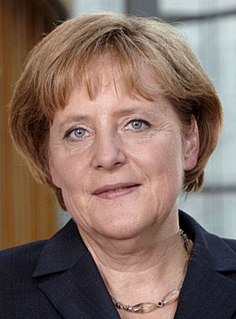
Federal elections took place on 27 September 2009 to elect the members of the 17th Bundestag (parliament) of Germany. Preliminary results showed that the Christian Democratic Union (CDU), its Bavarian sister party, the Christian Social Union (CSU), and the Free Democratic Party (FDP) won the election, and the three parties announced their intention to form a new centre-right government with Angela Merkel as Chancellor. Their main opponent, Frank-Walter Steinmeier's Social Democratic Party (SPD), conceded defeat. The Christian Democrats previously governed in coalition with the FDP in most of the 1949–1966 governments of Konrad Adenauer and Ludwig Erhard and the 1982–1998 governments of Helmut Kohl.
Merkel's first cabinet led the government of Germany from 22 November 2005 to 27 October 2009 throughout the 16th Bundestag. Led by Christian Democrat Angela Merkel, the first female chancellor in German history, the cabinet was supported by a grand coalition between the Christian Democratic Union (CDU), Christian Social Union of Bavaria (CSU), and the Social Democratic Party of Germany (SPD). It followed the Second Schröder cabinet. It ceased to function after the formation of Second Merkel cabinet, which was created after the 2009 federal elections, and was later sworn in on 28 October 2009.

David James "Mac" McAllister is a German politician and Member of the European Parliament (MEP) from Germany. He is a member of the Christian Democratic Union, part of the European People's Party. He is the current Vice President of the European People's Party and he is also Vice Chairman of the International Democrat Union. He was appointed Chair of the European Parliament Foreign Affairs Committee in February 2017.

The 2008 Lower Saxony state election was held in Lower Saxony in north-western Germany on 27 January 2008. Despite losing votes and seats, the ruling Christian Democratic Union (CDU) held on to its position as the leading party in the state. The CDU's coalition with the Free Democratic Party (FDP) was able to continue after the election, although their majority was cut from 29 to 10.

The Politics of Lower Saxony takes place within a framework of a federal parliamentary representative democratic republic, where the Federal Government of Germany exercises sovereign rights with certain powers reserved to the states of Germany including Lower Saxony. Since 1948 politics in the state has been dominated by the rightist Christian Democratic Union (CDU) and the leftist Social Democratic Party. Lower Saxony was one of the origins of the German environmentalist movement in reaction to the state government's support for underground nuclear waste disposal. This led to the formation of the German Green Party in 1980.

The history of Germany since 1990 spans the period following the Reunification of Germany, when West Germany and East Germany were reunited after being divided during the Cold War. Germany after 1990 is referred to by historians as the Berlin Republic. This time period is also determined by the ongoing process of the "inner reunification" of the formerly divided country.

Reiner Haseloff is a German politician who serves as the Minister President of the federal state of Saxony-Anhalt. A scientist like Chancellor Angela Merkel, he was widely considered as one of her closest party allies, but distanced himself from her during the European migrant crisis.
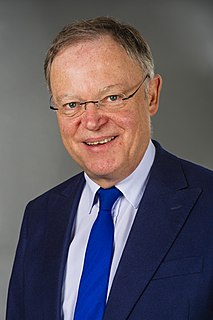
Stephan Weil is a German politician and the leader of the Social Democratic Party in Lower Saxony. On 20 January 2013, the SPD and the Green party won the 2013 Lower Saxony state election by one seat. On 19 February 2013, he was elected Prime Minister of Lower Saxony with the votes of SPD and Alliance '90/The Greens. From 1 November 2013 until 31 October 2014 he was President of the Bundesrat and ex officio deputy to the President of Germany. In November 2017, he was again elected Prime Minister of Lower Saxony with the votes of SPD and CDU.






